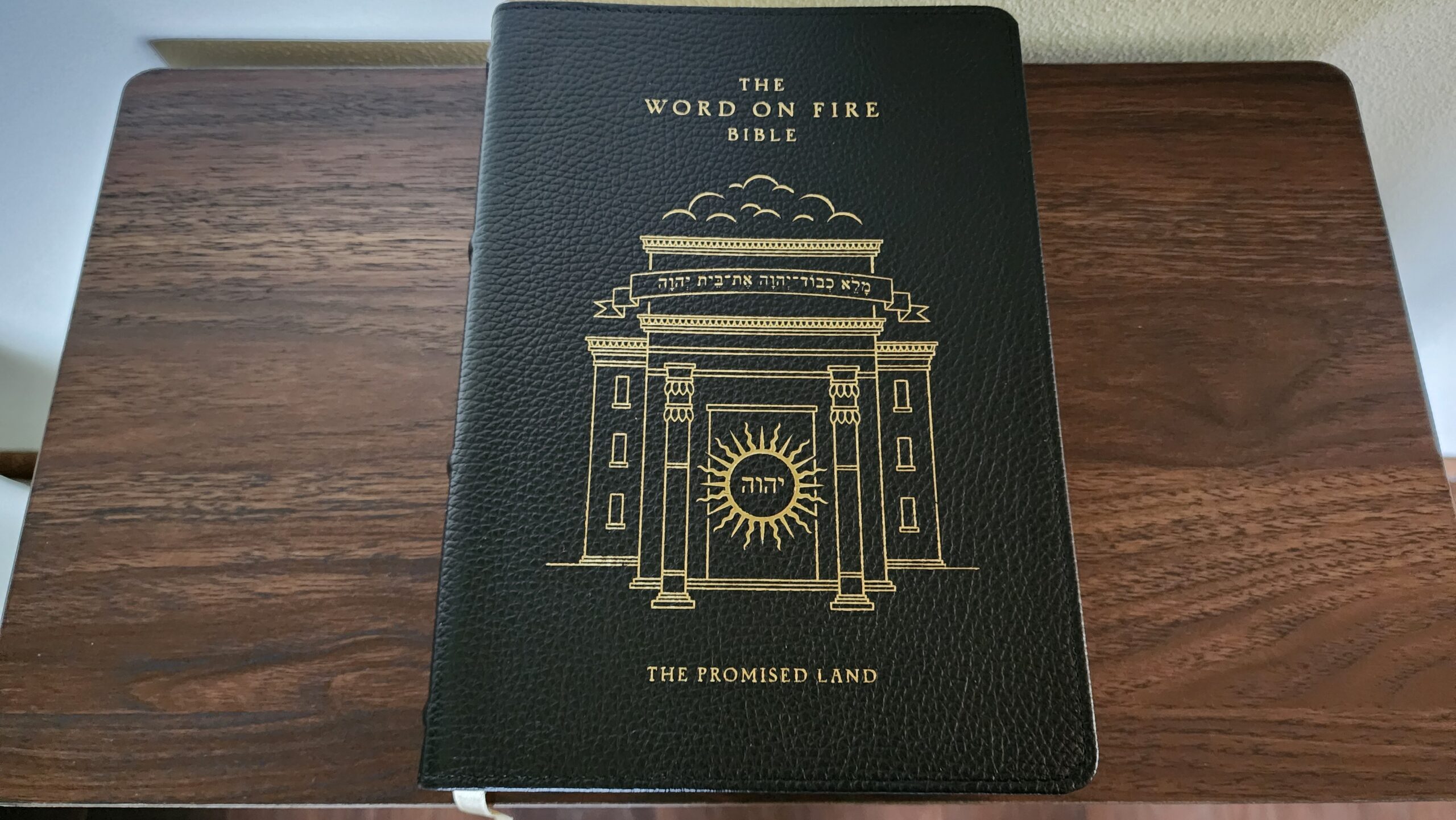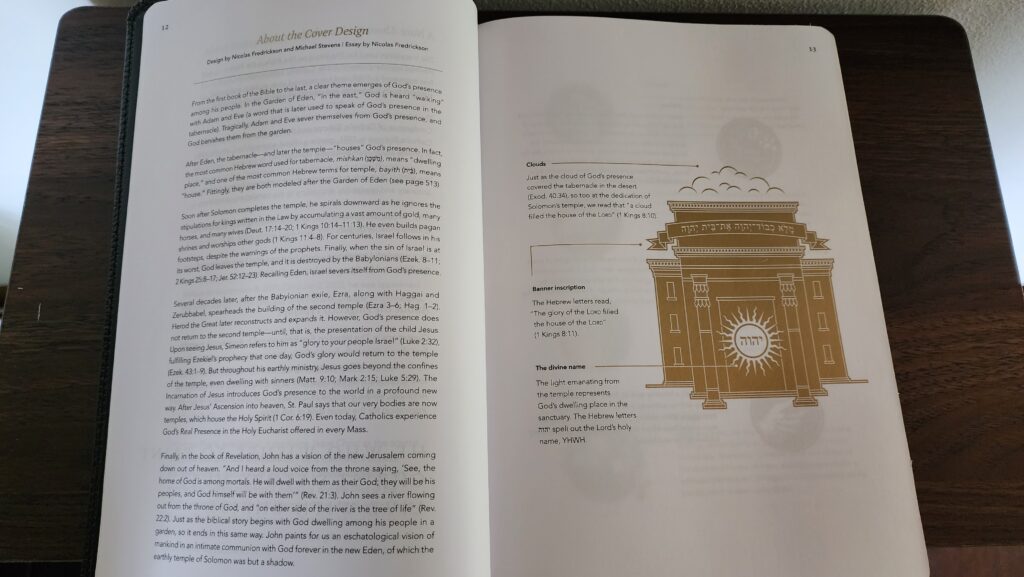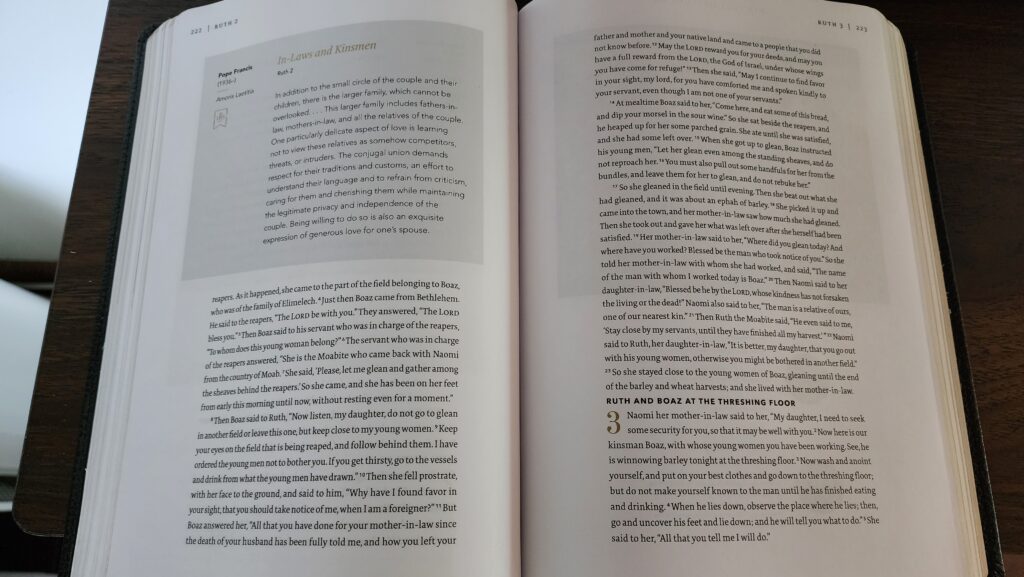
On Saturday, I received a copy of the newest installment of the Word on Fire Bible. This volume contains the books of the Old Testament from Joshua through 2 Kings. The subtitle, “The Promised Land,” refers to the arrival of the Israelites in the promised land and the conquest of Canaan beginning in the book of Joshua after wandering in the wilderness for 40 years.
I contributed to Word on Fire’s fundraising drive for this volume, so I received my copy as a pre-release thank-you gift. It is not yet available for sale, but I suspect the wait will not be too much longer.
For this first look, I will focus on the overall quality and physical construction.

Volume IV is a bit thinner than the past two installments in the series (Volume II covers Acts through Revelation, and Volume III covers the Pentateuch).
The physical construction and overall quality matches the previous volumes. The leather is very similar in texture and thickness (not as soft and supple as goatskin, but much better than bonded leather). The gold gilding on the page edges is exceptional in quality with a mirror-like finish, and there is a single gold ribbon marker.
The cover design is inspired by the Jerusalem Temple, and there is a two-page explanatory note in the beginning detailing the symbolism and meaning of the design.
As with previous volumes, the biblical text is printed in single-column format, with Bishop Barron’s commentary in double-column format and quotes from saints, Church Fathers, and theologians printed in shaded accent boxes. Here is an example page from the book of Ruth with a quote from Pope Francis:
I will be reading selections from the text over the next few weeks. I’m very interested to see how the commentary will approach some of the difficult and violent episodes recorded in this part of the Old Testament, especially since one of the aims of the Word on Fire Bible is to make the Bible accessible to seekers who may be encountering these passages for the first time.


Before the first WOF Bible volume came out, I’d never touched the NRSV. By the conclusion of this series, I’ll have 8 copies with it: the 7 WOF volumes and the Cambridge NRSV I’ve picked up along the way. Crazy to think about. I preordered the last 2 WOF volumes, but couldn’t do it this time around for reasons, so I’ll order it normally, presumably next month.
I’m just going to have to holfd my now with the nrsv and start buying these. They look beautiful.
I’m replying to myself. “Hold my nose” I meant to say. Ha ha typing too fast
I’m hoping they finally restock volume 3 in leather soon on UK website been waiting buy for months now lol. Hopefully can buy volume 3 &4 together next month.
Like any translation, the so-called “hotspots” are the only spots people ever hear about. And yeah, the NRSV has a few howlers – like Daniel 7:13, obviously. But, if you can read around a couple spots like that, I think you’ll find the NRSV to be extraordinarily accurate, literary, and edifying. It actually translates Jesus’s words to Mary at the Wedding at Cana correctly, unlike the RSV and ESV. I think it’s the most linguistically-pleasant OT to read, personally, and it uses LXX and DSS readings within the text, rather than just footnoting them (like the ESV does, much to my chagrin). And, the translation footnotes are excellent, and they’ll tell you any time there’s a more formal rendering that could be given.
I love my first three volumes in leather. This one I will wait on. You can find some great bargains on Ebay. I got the Pentateuch in leather for $35 mint on Ebay. I am glad to see the project continuing.
So, does it continue to use the NRSV, and not the NRSVue?
Yep, Volume IV is still using the NRSV.
I’m becoming curious as to whether WOF quietly pulled out of the NRSVue deal from when their name appeared on the sampler. The WOF Bible looks like it’ll retain the NRSV-CE throughout and WOF’s regular published books seem to also still be using the NRSV-CE.
The original NRSVue sampler listed the following publishers committed to using the NRSVue: Westminster John Knox, OUP, Fortress Press, WOF, Hendrickson, Zondervan, CUP, and the ABS. Of those, Westminster John Knox has the Westminster Study Bible coming out in September with the NRSVue, Hendrickson and Zondervan both sell regular NRSVue Bibles, and CUP just recently released their NRSVue Popular Text Edition w/ Apocrypha. OUP hasn’t released anything yet but they surely will update the NOAB with it; Fortress Press’s newest releases that are listed right now on their homepage, if they list a Bible translation on the copyright page at all, are still using the 1989 NRSV; WOF is still using the NRSV-CE unless someone who has purchased more recent WOF books can say otherwise; and I can’t speak to the ABS… though, very interestingly, the British and Foreign Bible Society (biblesociety.org.uk) lists and distributes a supposed “New Revised Standard Version Updated Edition (NRSVue) – Catholic Edition” (ISBN: 9780564037216).
Ok now I am confused. Is there even a CE of the nrsvue?
Biblical Catholic is right though, I could not find a physical copy of UE in any of the bookstores near me. Granted not much of a data point but still…
Yeah, I don’t know. I’ve never heard of a CE till finding that listing, so I feel like they just got the 73 books and organized them like the NRSV-CE and are calling it the NRSVue-CE without it actually being official. If it were official, we’d have heard about it and it wouldn’t just be sold by the BFBS. Though, I could be wrong.
I suspect you’re right. I think a similar thing happened with the Common English Bible several years ago. I vaguely remember that they released an e-book version of the CEB with the Old Testament books organized like the NRSV-CE.
No, there is no Catholic Edition of the NRSVue and likely never will be. There are significant moral and theological problems with the NRSVue, and not just in the legendary “two verses” (although they are bad enough) but in dozens of places. Even with the current problems in the Church, it could be given a nihil obstat only be a deranged bishop.
Could you expand on what moral and theological problems you’re referring to?
Just a hypothetical, let’s say there is a deranged bishop somewhere that gives nrsvue a jihil obstat, could it be rescinded?
The “infamous two verses” I am referring to are the passages from Paul’s epistles which, in the RSV are translated as “homosexual”, and are translated as “illicit sex” in the NRSVue with a marginal note claiming that the “meaning of the Greek is uncertain”, which is dishonest.
The meaning of the Greek is absolutely clear, what is unclear is the best way to translate the Greek into English. The RSV translation “homosexuals” is imprecise, but every Greek scholar knows what the Greek means, the problem is that the Greek is very explicit and a literal translation would be considered nearly pornographic or at least, very, very vulgar. And every Greek scholar knows that what is being condemned is homosexual behavior. The Greek here is a very graphic description of gay sex. To claim that the meaning is “unclear” is frankly a lie.
There are many other problems most of which amount to the translators doubling and tripling down on all of the most problematic aspects of the 1989 NRSV, including neutering the Old Testament messianic prophecies to make a Christian interpretation impossible and an increased use of inclusive language even when the pronoun in the original language refers to a specific male person. It is true that the NRSVue doesn’t go quite so far as to refer to Jesus as “they” but that will probably be in the next update.
I’m certainly aware of the “two verses” (1 Cor 6:9 and 1 Tim 1:10) and the NRSVue’s disputed (and arguably inaccurate) rendering of them. I was wondering what other theological and moral problems you had identified in the NRSVue. It sounds like you are primarily referring to increased inclusive language that neuters messianic prophecies? This was certainly an issue in the NRSV, but I haven’t seen an enumeration of additional areas where the NRSVue made the problem worse. The following review of the NRSVue in First Things magazine mentions that the NRSVue sometimes translates Old Testament references to “seed” as “descendants,” which obscures the singular grammar that St. Paul would later see as referring to Christ:
https://www.firstthings.com/web-exclusives/2023/02/an-evangelical-bible-translation
I checked a few relevant passages (Gen 12:7, Gen 15:18, Gen 22:17-18), but the NRSVue is identical to the NRSV in its use of either “offspring” (Gen 12:7, Gen 22:17-18) or “descendants” (Gen 15:18) in those passages. The use of “offspring” seems to me an excellent choice (used in both the NRSV and NRSVue) that can have either a singular or a plural meaning, operating in a similar way to the word “seed” which would be a more literal translation.
From what I gather, one primary reason why Rome insisted on changes to the NRSV lectionary in Canada was the NRSV’s use of plural language rather than the singular male form in passages that have Christological significance. It’s not so much that the NRSV completely precludes a Christological interpretation, but by translating a singular pronoun with a plural, it obscures the individual significance of the passage to one person–namely Christ.
For the liturgy, the Congregation for the Doctrine of the Faith (now called the Dicastery for the Doctrine of the Faith) drew a line that this type of plural inclusive language in Christological passages was not theologically acceptable. But it was not deemed unacceptable for private study and devotion.
From what I have seen in my own reading of it, the NRSVue is a relatively restrained update to the NRSV. If the NRSV can receive an imprimatur, I would not be surprised if the NRSVue can also receive one, but that remains to be seen. Even when it comes to the “two verses,” I suspect the NRSVue’s translation would not be grounds for denial of an imprimatur. As a counter example, both the RSV and NABRE use the vague word “immorality” to translate the Greek “porneia,” (which the NRSV translates “fornication”). But that vagueness (probably in the name of modesty and propriety) was not grounds for denying an imprimatur to either translation. I think the primary obstacle will be the huge effort involved in reviewing the entire text. I doubt the USCCB will want to expend the resources and effort. Perhaps another bishops conference will do so.
Marc,
In the 1989 NRSV preface, it is claimed that it only uses inclusive language horizontally (I.e. to refer to human beings) but never vertically (i.e. to refer to God), but this claim is false.
The NRSV not only does, on several occasions, use vertical inclusive language, but one of the translators publicly bragged about having “smuggled” it under the radar.
The preface is written by Bruce Metzger, who opposed inclusive language in general and resented that the demand for inclusive language was imposed by the NCC at nearly the last minute before publication, requiring them to go back and make thousands of changes to the text before it could be approved. It is doubtful he was aware that members of the translation committee defied the NCC mandate not to use vertical inclusive language thus it is likely that the error in the preface was sincere ignorance on Metzget’s part and not an intentional lie.
The ue takes the idea of vertical inclusive language even further than the 1989 edition because unlike in 1989, the committee actually had the mandate to use vertical inclusive language.
Now, the question is how closely do the bishops who are responsible for granting a nihil obstat and imprimatur actually read the text they are approving? Is the process just a rubber stamp for the sake of “ecumenism” or do they actually scrutinize the text line by line looking for potential problems?
If they do the latter, I don’t see any bishop could approve the vertical inclusive language which is strongly opposed to Church teaching.
“The ue takes the idea of vertical inclusive language even further than the 1989 edition because unlike in 1989, the committee actually had the mandate to use vertical inclusive language.”
I went back and looked at the NRSVue announcements and press releases, but I can’t find this anywhere. Am I missing something? Here is
the official announcement from the NCC, which doesn’t mention inclusive language at all.
The announcement in the 2017 SBL Society Report newsletter also doesn’t mention a mandate for vertical inclusive language (see page 7 of the newsletter).
This Q&A with Abraham Smith (Professor of New Testament at Southern Methodist University) refers to the new language about diseases and disabilities in the NRSVue, but does not mention any mandate for vertical inclusive language.
And spot-checks of numerous verses show that the NRSVue routinely uses male pronouns for God:
“On the sixth day God finished the work that he had done, and he rested on the seventh day from all the work that he had done. So God blessed the seventh day and hallowed it, because on it God rested from all the work that he had done in creation.” – Genesis 2:2-3
“When the LORD has brought you into the land of the Canaanites, as he swore to you and your ancestors, and has given it to you” – Exodus 13:11
“The LORD bless you and keep you;
the LORD make his face to shine upon you and be gracious to you;
the LORD lift up his countenance upon you and give you peace.” – Numbers 6:24-26
“But Moses said to him, ‘Are you jealous for my sake? Would that all the LORD’s people were prophets and that the LORD would put his spirit on them!'” – Numbers 11:29
“Therefore keep the commandments of the LORD your God by walking in his ways and by fearing him” – Deuteronomy 8:6
“Even if you are exiled to the ends of the world, from there the LORD your God will gather you, and from there he will take you back. The LORD your God will bring you into the land that your ancestors possessed, and you will possess it; he will make you more prosperous and numerous than your ancestors.” Deuteronomy 30:4-5
“The LORD makes poor and makes rich;
he brings low; he also exalts.
He raises up the poor from the dust;
he lifts the needy from the ash heap
to make them sit with princes
and inherit a seat of honor.
For the pillars of the earth are the LORD’s,
and on them he has set the world.” – 1 Samuel 2:7-8
“The LORD is king! Let the earth rejoice;
let the many coastlands be glad!
Clouds and thick darkness are all around him;
righteousness and justice are the foundation of his throne.
Fire goes before him
and consumes his adversaries on every side.
His lightnings light up the world;
the earth sees and trembles.” – Psalm 97:1-4
“Yet, O LORD, you are our Father;
we are the clay, and you are our potter;
we are all the work of your hand.” – Isaiah 64:8
Actually I would say the diseases and disabilities stuff is yet another example of why these liberal translations are on very shaky theological and historical grounds.
In 1990, JJM Roberts, who was one of the NRSV translators, wrote an article admitting his serious doubts about inclusive language saying, in reference to the decision to translate the letters of Saint Paul as being addressed to “brothers and sisters” rather than “brothers (the literal meaning of the Greek)
“It is likely that Paul was using the Greek term “brothers” in an inclusive sense … Nonetheless, Paul did not highlight a concern for inclusivity by using the compound expression “brothers and sisters.” To articulate this concern in translation by expressing what Paul left unexpressed is to impose a twentieth century, western cultural agenda on a first century text. Such anachronistic glosses make sociological or cultural appraisal of the world of the original text more difficult and cast doubts on the reliability of such a translation for serious historical work.”
This is putting it very gently, and the more they make these kinds of concessions, imposing 21st century notions of expressions into translations of the text, the more of a problem it becomes.
Isn’t the purpose of translation to try to find a way to express in English the impact the text had on the original audience? How can you do that if you constantly censor it in the name of one 21st century ideology after another?
The chief value of the NRSV is its usefulness in academia, but the more the text reflects more sensibilities the less useful it is for serious academic study.
“
Mine is in the mail
I’ve been collecting the hardcover editions, and have found them to be extremely spiritually edifying. This is such a a good project, and I’m so glad it is going along smoothly.
I’m sure the pre-order/donation request for volume 5 is coming soon and I will happily put down my money for another hardcover edition.
“New Revised Standard Version Updated Edition (NRSVue) – Catholic Edition
Discover the anglicised New Revised Standard Version Updated Edition (NRSVue) Bible. This Catholic Edition contains the deuterocanonical books in Septuagint order.“
So it’s just that it has the deuterocanon. If you look inside at the preface there is nothing about a Catholic edition.
Interrupting the NRSV debate to note that CTS has added the long awaited “Bible (ESV and Abbey Psalter)” to their “Coming Soon” list of things you can be notified about when pre-orders are made available. I’m guessing the layout will be similar if not the same as the CTS New Catholic Bible, though hopefully without the dreadful introductions and notes that accompanied that one.
https://www.ctsbooks.org/lectionary-site/register-your-interest-lectionary
Ok I finally broke down and got volume 1 and all I can say is wow. Absolutely beautiful. I wish we could buy a regular Bible that was this quality as opposed to a multi volume collection though.
How many volumes are planned? I honestly have no interest in a multi-volume Bible, I already have way too many Bibles, and I certainly don’t need a multi-volume edition, of whatever quality, of a Bible translation I already own multiple copies of.
Seven.
The complete WOF Bible is expected to be seven volumes.
Just got an email that Volume IV is now in stock.
The USCCB should fuse the NRSV to their project and create an NRSV-Definitive-CE that solves the gender inclusion problem, ideological problems, and issues that Catholics see in the text and make it appropriate for liturgical use and academic study. But naturally this is not the case, and yet the USCCB trusts it to be cited alongside the RSVCE in their Catechism in a Year (gold colored) book. Therefore it seems the vanilla NRSVCE might likely be the best ecumenical-dominant Catholic translation. Those who dispute the NRSVCE’s integrity should directly contact Bishop Robert Barron and find out why he uses it in his WOF Bible since it’s clear that it’s already approved in the US and it may just be the most accurate (Protestant-based) Catholic translation outside of the Abbey Psalter and company.